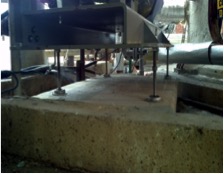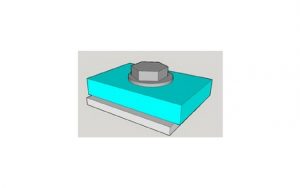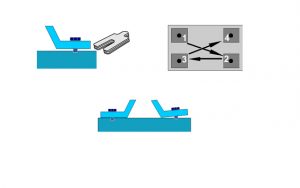Machinery misalignment is a known cause of machinery vibration. Lesser known is the fact that machinery vibration from external sources can adversely affect the quality of the alignment of nearby machines. This is true whether you are  aligning with lasers or dial indicators.
aligning with lasers or dial indicators.
Excessive vibration on machines which are not running can cause serious damage to that machine. The weight of the rotor supported by the bearings, and the forces put upon it by vibration from external sources, can cause false brinelling of the bearings. Over time it will damage the bearing races.
Your first concern, in all honesty, should be to determine the cause of the vibration from the nearby machine, and correct it. Because the best alignment in the world will not extend machine life if:
- The machine you wish to align is exposed to excessive vibration from a nearby machine.
- The machine you wish to align is down for extended periods of time. This can be more damaging to the bearings than if the machine exposed to external vibration is running.
But sometimes you are not allowed to shut down the offending machine.
Here are some guidelines on performing an accurate alignment on a machine that is experiencing vibration from a nearby machine. These tests serve to help isolate the machine to be aligned from the offending vibrating machine.
- Check for loose bolting connections, at the machine feet, flanges, bases, etc.
- Look for pipe strain. Check the pipe hangers, stiff legs, and all piping supports in the area, especially on the piping which might share a common header with the machine you are trying to align.
- Check for soft foot, both under the driver, and driven components. Not just the motor or driven machine feet, but the baseplate, lag bolts – every bolted component between the shafts and the floor.
If these methods do not reduce the vibration being transmitted from the nearby machine, and you still must perform an alignment:
- Make sure your laser brackets, chains, magnets, rods – any mechanical connections being employed to measure alignment – are TIGHT.
- Proceed with attempting the first alignment measurements.
- Repeat the alignment measurement again, and compare it to your first measurement. If your numbers are repeatable, continue on with the alignment as usual.
If they do not repeat:
- Increase the sampling time. Double it. And perform the same two tests to check for repeatability.
- Utilize filtering processes, available on some alignment tools, to try and minimize the effect of the vibration.
If none of these will work, find out if the offending machine can be shut down long enough to measure the misalignment on the machine you trying to align. Since this only takes a moment, it may not affect production/operation levels.
Keep in mind that “repeatability” of the alignment data in this situation is relative. If the data repeats within the amount of tolerance allowed for the misalignment, you can aim to get the alignment as close to zero as possible. In doing this, even if your alignment data is off, it should be off no more than the allowed tolerance, and should be acceptable.
Lastly, if none of these can be done, the machine probably cannot be aligned while the offending machine is running. In this case, you should simply align as closely as possible, and realign the machine when the offending machine can be scheduled for a shutdown.



